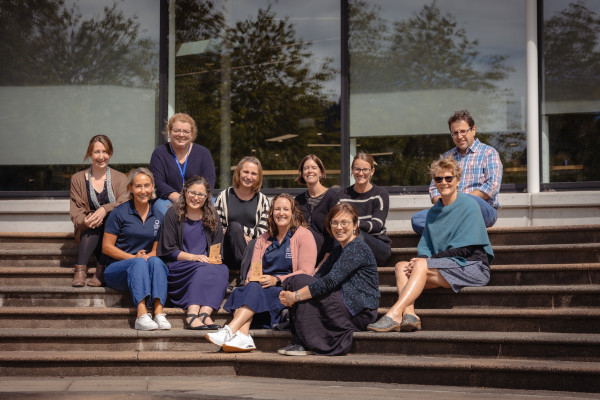- Tūhono home Hoki ki Tūhono
-
- Staff Directory
- Chief Executive Office Auckland International Office Corporate Services Finance Campus Services Functions and Catering Information Systems and Support Marketing, Communications and Engagement Learner Journey Academic Registry International Learner Services Te Punaka Ōwheo
- Learner Experience Academic Excellence Central Campus College of Community Development and Personal Wellbeing College of Engineering, Construction and Living Sciences College of Health College of Work Based Learning Open Education Resource/OERu Research and Postgraduate Studies Te Maru Pumanawa | College of Creative Practice and Enterprise
- Māori Development and Kaitohutohu Office People, Culture & Safety People and Culture Childcare Centre Te Ama Ako | Learning and Teaching Development Wellbeing and Safety Auckland Staff Directory Executive Office Academic Corporate Services Marketing and Business Development Human Resources Campus Quality and Programme Development
-
 Our people make a better world
Our people make a better world
We build the capabilities of individuals, organisations and communities and help them to realise their potential.
Staff Directory
-
- Tools
- Academic Integrity Declaration Form AIC applications dashboard Approved programmes Approved programme fees Centralised assessement repository Chemwatch Course evaluation and surveys CRM applications CRM customer service hub Delegations policy/process Disability and neurodiversity Dynamics 365 (CRM) EBS Ontrack EBS Report Email security personal portal Employment Matters / Solarworkplace / Performance reviews eTaxi eTV
- Financial variance reporting Hidden Disabilities Sunflower programme FCM travel intranet InPlace International entry requirements Knowledgebase articles Learner support dashboards Linkedin Learning Log a job with Marketing Login as an applicant Media consent form Microsoft 365 Moderation App Moodle OP Docs OP Docs - Publishing OP Image Libraries Performance Excellence Portal Product Evaluation Panel
- Policy Library Privacy Programme and course design/development Qualtrics XM RDS Remote access support portal Research Database Robertson Library Staff FAQs about graduation Status of Programmes Student intranet (Kāpehu) Study Abroad info for learners Taha Talks (videos for students) Tūhauora I Wellbeing resources Uniprint Vault Webexpenses Auckland tools
-
 Vault
Had an accident or near miss?
Log it here
Vault
Had an accident or near miss?
Log it here
-
- Communities
- Community AI Steering Committee Ally Network EBS Community of Interest EdTech Champions Health & Wellbeing Research Internal Evaluation Neurodiversity Professional Team Professoriate Proud@OP Student Support Website Advisory Group Web Champions Working under the Rainbow Project Learner Capability Trade Training Centre
- Committee Academic Committee Animals@OP Diversity and Equity Doctor of Professional Practice Committee Kaunihera Whakahaere - Leadership Council Internal Evaluation Learning & Teaching Leadership Team Library Committee Mental Health and Wellbeing Advisory Group Otago Polytechnic Board of Directors Pastoral Care Code Committee Programme Approvals Committee Research and Postgraduate Committee Research Ethics Committee Staff Subcommittee
- Think Tanks Mātauraka Our learners achieve educational success Pūtea Our financial success Tākata Our people, our team, our community Tiriti Our active commitment as a Treaty partner Tūroa Our commitment to be a sustainable and responsive organisation
-
 Create a community
Create a community
Do you have a community, committee or project that you'd like represented here?
Communities
-
- About OP
- Keep up to date All news All events All notices All blogs Share your info Create a news article Create an event Create a notice Create a blog
- Community and Partnerships Alumni and friends Education Foundation Operational information Academic calendar 2025 Academic calendar 2026 Current vacancies Dunedin campus map Our policies Topical FAQs
- Who we are About OP Commemorative sites Māori Strategic Framework OP merchandise Our history Our strategic priorities Pasifika Strategic Framework (2025-2030) Vision and Values Working for us OP job opportunities Wellbeing Calendar Working at OP
-
New Zealand: 0800 762 786
contact us
International: +64 3 477 3014
Seeking safe harbour: Water immersion for women with complex pregnancy
Author: Kelly Kara
Seeking safe harbour: Water immersion for women with complex pregnancy
Kelly Kara
27 August 2021
Kara, K. (2021). Seeking safe harbour: Water immersion for women with complex pregnancy. (A thesis submitted in fulfilment of the degree of Master of Midwifery at Otago Polytechnic.) https://doi.org/10.34074/thes.5592
Abstract
Background: Water immersion is used by women, particularly within midwifery-led settings, as a strategy to manage the sensations of labour. Low-risk women who have used water immersion in labour express feelings of increased relaxation, support and control in their labour and birth experience. Being labelled ‘high risk’ can significantly impact both a woman’s experience of her pregnancy and her opportunity for experiencing a physiological birth. Women with complex pregnancies have reported an increase in anxiety and a feeling that their normal childbearing journey has been interrupted and subsumed by medical monitoring and risk management. Midwifery frameworks in Aotearoa New Zealand protect and promote the woman’s role as a decision maker within her experience and her right to make informed decisions about her care.
Aims: The aim of this research was to develop an understanding of the influences, facilitators and barriers for women who chose to use water immersion for labour and birth, in a hospital setting, when they were labelled/identified as being clinically complex, as well as to explore their experience of using water immersion in labour.
Methods: A qualitative descriptive inquiry, using semi-structured interviews was undertaken to explore seven women's experiences of using water immersion during their labour and/or birth after having a complex pregnancy. Inductive thematic analysis was used to analyse participant data.
Findings: Thematic analysis identified four themes within the women’s experiences. Women use water immersion to resist the medicalisation of their birthing experience and protect themselves from the iatrogenic risks of birthing within a hospital setting. The desire to use water immersion is often driven by dissatisfaction with previous medicalised experiences of birth and the women’s desire to avoid repeating these experiences. Water provides a safe and protected space to labour which supports a sense of control and privacy. The LMC midwife is a vital ally and advocate in negotiating to use water immersion within the hospital setting. In this environment, staff can either facilitate or be barriers to using water immersion in labour with a complex pregnancy.
Conclusions: Women use water immersion in labour to optimise their opportunity for physiological birthing, often in response to previous medicalised births. Water immersion is experienced positively as a strategy to manage labour. Individualised holistic midwifery care from a Lead Maternity Care midwife was valued by the women and viewed as a key support in negotiating for the choice of water immersion. Women needed to purposefully seek a midwife who was willing to support them in their choice to use water immersion.
Keywords: water immersion, physiological birth, water birth, complex pregnancy
Kelly's primary supervisor was Suzanne Miller.
Licence
This thesis is available under a Creative Commons Attribution-NonCommercial licence CC BY-NC 4.0 International.